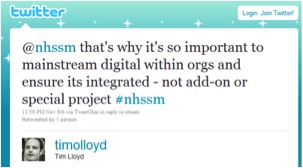Social media isn’t everything
I’m reminded of this fact when people call me up to talk about how they can (best) use Twitter.
The common denominator between Twitterers and non-Twitterers is usually the knowledge that Twitter exists and that tweets are limited to 140 characters.
At the mention of DMs, RTs and hashtags the phone line goes quiet. There is a lot of educating to be done.
Why do I start on a seemingly negative point? Let’s sit back for a minute or two, look around us, and consider who we’re working with
and how we must act as educators in the subject of social media.
Pumped
As a junior NHS communicator and member of Generation Y, I am told that my work is to change things, to improve on the old, and shine a light on the huge potential that professional communicators bring to the NHS.
Title image via mozzercork‘s Flickrstream, Creative Commons
I’m pumped up on motivation, education and a feeling of opportunity, in a world where jobs and a career are ever harder to find. It is a dangerous, volatile mix.
Were I to take the hype at face value I would risk alienating my colleagues in a hailstorm of young buck arrogance.
However, if I don’t challenge the current system with the all powerful “why,” I could waste an opportunity to help staff put communications at the center of what they do, ultimately improving the public’s experience of the NHS.
#nhssm
Out of this careful balancing act between naïve arrogance and passive acceptance, #nhssm was born.
It brings together NHS communications professionals who use social media and want the NHS to realise the potential it brings to increase the level of service we offer.
As you will see from the video below, #nhssm is now evolving into something with an offline presence, taking what we are learning each Monday from 12 noon GMT to a wider audience;
an audience that we can’t always connect with online; an audience that requests evidence that social media won’t bring the NHS to its knees with a multitude of confidentiality breaches; an audience that needs advice and support.
Evidence
 Great examples of well worked social media messages exist; NHS Choices and NHS Local both are providing their audiences with relevant messages that resonate and help inform health care decisions and opinions.
Great examples of well worked social media messages exist; NHS Choices and NHS Local both are providing their audiences with relevant messages that resonate and help inform health care decisions and opinions.
Behaviour change at its best without breaching confidentiality.
While the case studies, lessons and “in-their-spare-time” motivated #nhssm teachers are all out there, social media in the NHS is still only seen as an add-on, a nice to do.
As Tim Lloyd, Department of Health Deputy Head of Digital Communications (tweeting in a personal capacity), quite rightly tweeted:
Communicators as educators
To get social media use into the mainstream we need to educate our colleagues. This applies to all sectors.
If the audience is skeptical, I see my job as a professional communicator to be one of challenging that skepticism, providing the evidence for social media as a useful tool in an NHS communicator’s toolbox.
There are always two sides to every advance in communications. Without communicators educating each other and subsequently all NHS staff about the positives of social media, we risk the NHS only hearing the negative side.
Are you, as a professional communicator, taking your role as an educator seriously?
As Gemma Went quite rightly wrote, we in social media must remember that the majority of people are not yet at our level of uptake. As professional communicators we must remember our training and intuition for seeing the bigger picture.
We mustn’t become so infatuated that we blindly promote social media from only our point of view. We must understand, confront and openly discuss opposition to social media use (in and outside of health care).
It is only with this collaborative approach that we can win the trust of and begin to educate our colleagues, line managers and directors.
By bringing our colleagues with us and not leaving them in our wake, we can avoid the classic breakdown in communications between supporters and detractors… helping us be the communicators of internal change.
Let’s avoid a shouting match.
#nhssm has taught me a lot about managing resistance to change. Have social media projects you’ve worked on also required you to educate your (internal or external) client? Do you see being an educator as part of your professional communicator role? It’d be great to hear if others disagree or agree with me on the other side of the pond!
More: Bryce Keane originally brought Alex and his efforts to my attention in his first guest post on the NHS’ social media efforts.
 Alex Talbott graduated from the University of Leicester in 2009 with a first in Biological Sciences. He is part of the first-ever NHS Communications Graduate Training Scheme, which includes studying for a post-graduate Diploma in Strategic Communications at Leeds Metropolitan University. Alex founded the #nhssm tweet chat and has now handed over the reins to Tim Lloyd and Colin Wren, as he moves to a hospital which ironically blanket bans access to social media. You can catch all the #nhssm action at @nhssm and its accompanying Posterous blog. In his spare time Alex plays Ultimate Frisbee, occasionally attempts to practice his German and enjoys sampling real ales.
Alex Talbott graduated from the University of Leicester in 2009 with a first in Biological Sciences. He is part of the first-ever NHS Communications Graduate Training Scheme, which includes studying for a post-graduate Diploma in Strategic Communications at Leeds Metropolitan University. Alex founded the #nhssm tweet chat and has now handed over the reins to Tim Lloyd and Colin Wren, as he moves to a hospital which ironically blanket bans access to social media. You can catch all the #nhssm action at @nhssm and its accompanying Posterous blog. In his spare time Alex plays Ultimate Frisbee, occasionally attempts to practice his German and enjoys sampling real ales.










Enjoyed the post Alex. As an SpR in public health I’m acutely aware of how we could be doing a much better job to engage with our local populations through SM. As you point out, NHS choices, NHS Local and NHS Clinical Knowledge Summaries are all great sites helping create relevant new channels of communication with the populations we serve.
I’m fairly new to twitter, and have been working in academia the whole time since I started using it. I’ve found it an invaluable tool for my work and can see it’s massive potential in Public Health. I return to a more formal NHS work environment in Jan 2011 and I wonder how my colleagues there might view my use of SM sites such as twitter in the workplace. I suspect my use of the service might be greatly restricted which would be a shame. I shall definitely be following #nhssm as best as I can though…
Hi Rob,
Thanks for the comment. Academics using twitter seem to be ahead of the game from my experience. I think it’s a very good point and something #nhssm could look at more thoroughly – how can social media be used to spread best practice across NHS staff groups.
But, as you mention the first hurdle is trying to get access! I think you have a great opportunity in January to begin to educate people about social media, how it is helping you be more informed etc. Education is key ;)
Couldn’t agree more. Breaking down social media into manageable chunks and making it mainstream is vital. Hopefully then organisations will see its benefits as something they can use, rather than just friends chatting about what they had for tea (the unnecessarily harsh criticism usually aimed at Twitter and Facebook). As the post says, understanding when and where it is appropriate or not is also important to understand how best it can be utilised. Looking forward to seeing how #nhssm evolves.
Great post.
Thanks for taking the time to comment Laura!
I think that harsh criticism comes in part from people not understanding what social media is at the most basic level. I hope that with people like you on board the #nhssm community will be able to start to educate our fellow colleagues and indeed our bosses. Giving them the knowledge to make an informed decision instead or a snap judgement.
It’ll indeed be interesting to see were we are with that in 6 months :)
I really like this for a number of reasons. It’s no secret that I’ve been a champion of the work Alex is doing within the NHS since I first heard about it here in the UK. This is because the level of challenge Alex has faced in even getting this far would have probably turned away many a creative agency boffin – but he’s kept at it, and he’s smart about what’s possible and realistic about the limitations. As Shonali pointed out in the video, this is made infinitely tougher by the double header of working within a Government organisation in healthcare. I wish #NHSSM the very best of success and I hope that their success, in time, may form the framework for future social media uptake by other governments and healthcare bodies around the world. A truly fascinating case study in communication.
Thanks for such a positive comment Bryce :)
It would be fantastic if some of the lessons we’re learning through #nhssm could help others in similar healthcare comms positions. A lot of that depends on how well we manage to integrate those lessons and digital comms within the NHS, hence why we’re now looking to complement the online with offline activities to reach those not yet on social media or those wary of its use. It’ll be a lot of hard work, but after that we may be able to go global…
[…] This post was mentioned on Twitter by Vikki Chowney, Tim Lloyd, Bryce Keane, Alex Talbott, Alex Talbott and others. Alex Talbott said: New by me: 'Social Media: Being Communicators of Change' http://bit.ly/gQOmR6 ft. @nhssm @timolloyd @include_music_h & @GemmaWent #nhssm […]